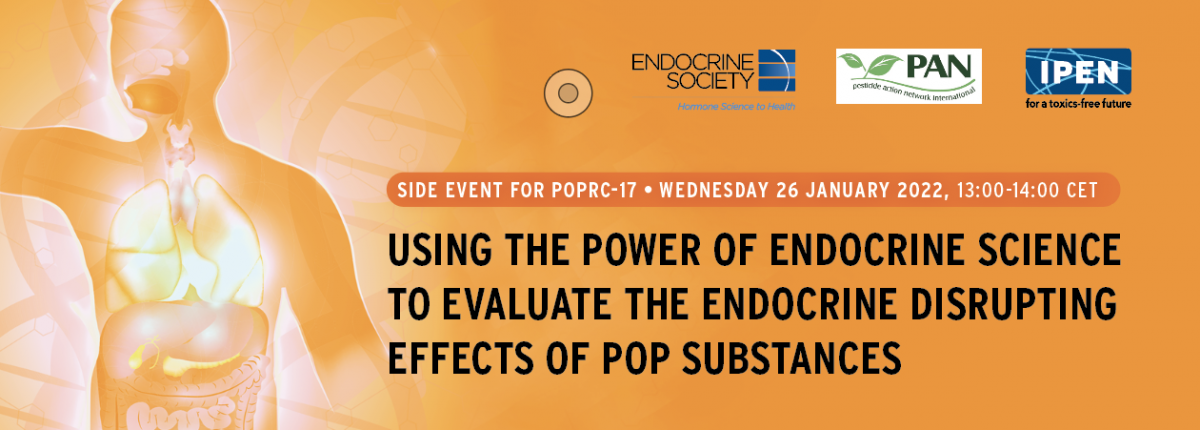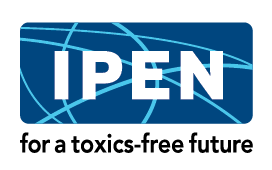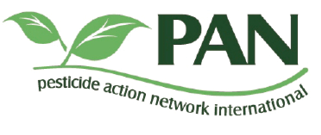POPRC-17 Side Event on Endocrine Science EDCs and POPs

The purpose of this side event, “Using the Power of Endocrine Science to Evaluate the Endocrine Disrupting Effects of POP Substances,” is to inform POPRC members and observers about the importance of using principles of endocrinology to evaluate hazards of endocrine disrupting chemicals (EDCs) and other related adverse effects of persistent organic pollutants. Speakers will explain these principles—now being used by global regulatory agencies—using chemicals that are under current evaluation as exemplars or case studies, including medium chain chlorinated paraffins. Speakers will address why the basic concept that the “dose makes the poison” does not apply in the evaluation of endocrine disrupting properties, including low dose non-monotonic effects and their health manifestations, and the importance of assessing critical windows of development.
Speakers Thomas Zoeller and Åke Bergmann were editors of the State of the Science of Endocrine Disrupting Chemicals report published by the World Health Organization and United Nations Environment Programme (2012).
Speakers
 Thomas Zoeller
Thomas Zoeller
Dr. Zoeller’s research focuses broadly on the effects of man-made chemicals on human health by interfering with endocrine systems. Trained in neuroendocrinology, he served on a US EPA committee to develop methods for identifying chemicals that had these effects. His primary research on the role of thyroid hormone in brain development led to his concern that EPA-accepted methods were simply not adequate. His research since then has included ways environmental chemicals can interfere with thyroid hormone action, and ways tests can be designed to identify such chemicals before human exposure. He is a Professor Emeritus at the University of Massachusetts Amherst and is a visiting professor at Örebro University where he focuses on these issues as part of the ATHENA project, a Horizon 2020 project funded by the EU.
 Åke Bergman
Åke Bergman
Dr. Bergman has been in organic environmental chemistry research since 1975, focusing on human and wildlife exposures to organic contaminants, both persistent and semi-persistent chemicals, as well as understanding chemical reactivities of compounds present in the environment. Working with scientists across disciplines, his research has focused particularly on endocrine effects of chemicals. He initiated and catalyzed much early research on flame retardants, particularly the brominated flame retardants (BFRs), in the 1990’s and onwards. Identification of new environmental contaminants is a major interest as well, understanding that well-defined compounds of interest are a prerequisite. His research has included development of or modifications of methods for synthesis of (potential) environmental contaminants, their metabolites and abiotically transformed products.
 Megan Horton
Megan Horton
Dr. Megan Horton, MPH, PhD, is an environmental epidemiologist with expertise studying the impacts of exposure to neurotoxicant chemicals throughout gestation and early childhood on brain development and cognitive/behavioral outcomes. Her lab integrates exposure science, environmental epidemiology, neuroimaging, and advanced statistical approaches to understand how our environment impacts human health. Over the last decade, she has focused on using magnetic resonance imaging (MRI) to study structural and functional brain changes associated with early-life neurotoxicant exposures, including exposure to residential pesticide applications containing chlorpyrifos. Dr. Horton is currently Associate Professor in the Department of Environmental Medicine and Public Health at Icahn School of Medicine at Mount Sinai. Her research laboratory is funded by the National Institutes of Health and the National Institute for Occupational Safety and Health.
Sponsoring Organizations include the Endocrine Society, International Pollutants Elimination Network (IPEN), and Pesticide Action Network (PAN)
 Endocrine Society is a global community of over 18,000 physicians and scientists dedicated to accelerating scientific breakthroughs and improving patient health and well-being. The Society is devoted to advancing hormone research, excellence in the clinical practice of endocrinology, broadening understanding of the critical role hormones play in health, and advocating on behalf of the global endocrinology community.
Endocrine Society is a global community of over 18,000 physicians and scientists dedicated to accelerating scientific breakthroughs and improving patient health and well-being. The Society is devoted to advancing hormone research, excellence in the clinical practice of endocrinology, broadening understanding of the critical role hormones play in health, and advocating on behalf of the global endocrinology community.
 The International Pollutants Elimination Network (IPEN) is a global network forging a healthier world where people and the environment are no longer harmed by the production, use, and disposal of toxic chemicals. Over 600 public interest NGOs in more than 120 countries, largely low- and middle-income nations, comprise IPEN and work to strengthen global and national chemicals and waste policies, contribute to ground-breaking research, and build a global movement for a toxics-free future.
The International Pollutants Elimination Network (IPEN) is a global network forging a healthier world where people and the environment are no longer harmed by the production, use, and disposal of toxic chemicals. Over 600 public interest NGOs in more than 120 countries, largely low- and middle-income nations, comprise IPEN and work to strengthen global and national chemicals and waste policies, contribute to ground-breaking research, and build a global movement for a toxics-free future.
 Pesticide Action Network (PAN) is a network of over 600 participating nongovernmental organizations, institutions, and individuals in over 90 countries working to replace the use of hazardous pesticides with ecologically sound and socially just alternatives. PAN was founded in 1982 and has five independent, collaborating Regional Centers that implement its projects and campaigns.
Pesticide Action Network (PAN) is a network of over 600 participating nongovernmental organizations, institutions, and individuals in over 90 countries working to replace the use of hazardous pesticides with ecologically sound and socially just alternatives. PAN was founded in 1982 and has five independent, collaborating Regional Centers that implement its projects and campaigns.
| Attachment | Size |
|---|---|
| 800.08 KB |
